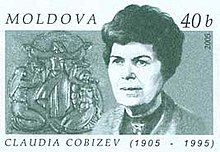Claudia Cobizev (Russian: Клавдия Семёновна Кобизева, romanized: Klavdiya Semyonovna Kobizeva; 20 March 1905 – 28 April 1995) was a Soviet realist sculptor from the Moldavian Soviet Socialist Republic. Known for the sensitivity she introduced to her soviet realist works, many of her sculptures and reliefs are held in the National Museum of Fine Arts, Chișinău.
Education
editCobizev was born on 20 March 1905 in Chișinău. She studied at the Academy of Fine Arts under Alexandru Plămădeala, graduating in 1931. She continued her studies at Académie Royale des Beaux-Arts and at the Academy of Arts in Bucharest. She remained in Bucharest working for the sculptor Cornel Medrea and Constantin Baraschi (ro) until 1936.[1][2]
Career
editCobizev's work was first exhibited in 1930 by the Fine Arts Society of Bessarabia.[1] Many of her works were inspired by the lives and experiences of rural, Moldavian women.[3] She is also known for her sensitive portrayal of children.[4] A pioneer in Moldovan post-war sculptural practice,[5][6] she also produced works inspired by socialist realism, both in bronze and aluminium, that protested against capitalism.[7] She was also known for her works in sculptural relief.[8][2] This included the interior of a Palace of Culture in Chișinău.[9]
In 1948 her work Cap de moldoveancă was exhibited at the Paris International Exhibition to wide acclaim.[2] It was viewed as both a symbol of Moldova, and a symbol of the strength of women.[4] From 1951 to 1952 she was commissioned to produce several works which were displayed as part of the Exhibition of Achievements of the National Economy (EREN) of Moldova in Moscow.[1] She later exhibited across the states of the former USSR, including in Ulan-Bator.[10] In the late 1950s she was commissioned to produce a sculpture of soil scientist and founder of Tashkent University, Nikolay Dimo (ru).[4]
Awards
editNotable works
editLegacy
editCobizev worked in soviet realist style producing works that conveyed state-driven ideology, yet, according to historian Ana Marian, she was also able to convey "psychological insight" into the people from across Moldova who she portrayed. In terms of Soviet art, her works have been compared to those of Soviet sculptor Lazar Dubinovsky.[4]
Many of her works are held in the National Museum of Fine Arts, Chișinău.[13] To commemorate the centenary of her birth in 2005, a commemorative stamp was designed by Simon Zamsha.[14]
References
edit- ^ a b c d e "In memoriam sculptorului Claudia Cobizev". moldovenii.md (in Romanian). Retrieved 2023-05-13.
- ^ a b c d e Malcoci, Vitalie. "115 ani de la nașterea celebrei sculptoriţe Claudia Cobizev." Arta 1 (AV) (2020): 175-176.
- ^ "Claudia Cobizev a făcut din schiţe adevărate opere de artă". TRM (in Romanian). 2022-01-05. Retrieved 2023-05-13.
- ^ a b c d e f Marian, Ana. "Particularităţile portretului în creaţia Claudiei Cobizev." Arta 1 (AV) (2015): 150-156.
- ^ "Sculptura". www.mnam.md. Retrieved 2023-05-13.
- ^ Colesnic, Iurie (2000). Femei din Moldova: enciclopedie (in Romanian). Museum. ISBN 978-9975-905-42-8.
- ^ "Country profile: Moldova". New Internationalist. 2023-02-28. Retrieved 2023-05-13.
- ^ Marian, Ana (2013). "Relieful decorativ în creaţia claudiei Сobizev" (PDF). Arta Moderna Si Contemporana: 111–116.
- ^ Colesnic, Iurie (1997). Chișinău: enciclopedie (in Romanian). Museum. ISBN 978-9975-906-16-6.
- ^ a b "The Virtual Gallery of the Contemporary Art from the Republic of Moldova | Sculpture | Claudia Cobizev". www.arta.neonet.md. Retrieved 2023-05-13.
- ^ "Claudia Cobizev | Cap de moldoveanca, 1947, lemn, 40x22x28". www.arta.neonet.md. Retrieved 2023-05-13.
- ^ "Claudia Cobizev | The Mistress of the Land, 1981, metal, 83x22x21". www.arta.neonet.md. Retrieved 2023-05-13.
- ^ "National Museum of Fine Arts | Chisinau". Visit Chișinău. Retrieved 2023-05-13.
- ^ "Birth Centenary of Claudia Cobizev". home.nestor.minsk.by. Retrieved 2023-05-13.
External links
edit- Claudia Cobizev short film by Teleradio Moldova
